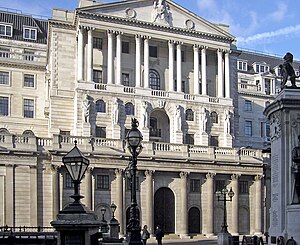
Image via Wikipedia
By Dominic Midgley
In a major position paper, Charles Bean said that the Bank had been powerless to prevent what he called the "Great Contraction" of 2008 because control of interest rates was not, in itself, a powerful enough tool.
He also hinted that the days of quantitative easing may not be over: "The deleveraging process is incomplete, the recovery remains fragile and a considerable margin of spare capacity is yet to be worked off," he said. "Further policy action may yet be necessary to keep the recovery on track."
He was speaking at the Jackson Hole Economic Policy Symposium in America the day after the Federal Reserve chairman, Ben Bernanke, buoyed the markets with an upbeat assessment of the US's growth prospects.
Mr Bernanke also hinted that he was prepared to employ more asset purchases if necessary.
But Mr Bean devoted much of his speech to promoting the need to extend the range of the Bank of England's powers as part of the new "macro-prudential policy" – details of which will be revealed in the Financial Services Regulation Bill later this year.
In his speech, Mr Bean gave examples of the sort of powers that could underpin such a policy.
These included the right to force banks to build up extra reserves during boom times, increase risk-weights on high-risk lenders and impose loan-to-value ratios in the mortgage market.
Bank of England will use 'all powers' to stave off any future crisis

No comments:
Post a Comment